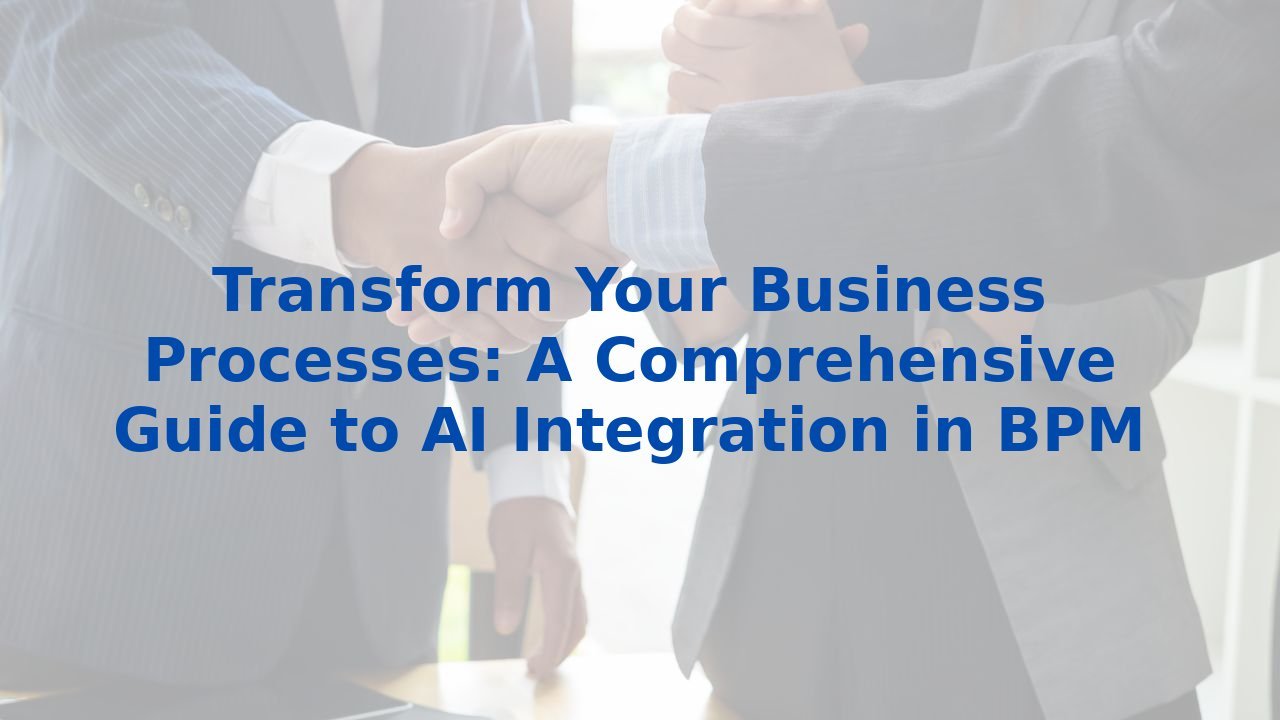Transform Your Business Processes: A Comprehensive Guide to AI Integration in BPM
Transform Your Business Processes: A Comprehensive Guide to AI Integration in BPM
In today's fast-paced business landscape, organizations are constantly seeking ways to enhance efficiency and productivity. Business process management (BPM) has long served as a vital framework for improving operational workflows. Yet, the transformative power of artificial intelligence (AI) is ushering in an era of unprecedented innovation within BPM. This guide will explore how AI can elevate your business processes and equip your workforce for future challenges.
Understanding Business Process Management
BPM is the systematic approach to analyzing, designing, executing, and optimizing business processes. These processes form the backbone of an organization's operations, encompassing everything from customer service to supply chain management. Historically, BPM has relied on manual methods, which can be labor-intensive and prone to errors. However, with the advent of AI, there's a paradigm shift occurring.
The Role of AI in Business Process Management
AI is changing the BPM landscape by enabling automation and optimization across various operational facets. Here are some pivotal components where AI significantly enhances BPM:
- Data Analysis: One of AI's most powerful capabilities lies in its aptitude for processing large datasets. AI can uncover trends, forecast outcomes, and determine root causes far quicker than traditional methods. This data-centric approach fosters informed decision-making, aligning strategies more closely with market realities.
- Process Building: AI can create new workflows based on user-defined parameters, significantly streamlining the process development phase. This agile capability allows organizations to implement new processes swiftly and with great efficiency.
- Automation: Perhaps the most visible impact of AI in BPM is automation. Tasks like invoice processing, data collection, and even scheduling can now be handled autonomously, liberating valuable time for employees to focus on strategic initiatives.
Benefits of AI Integration
The incorporation of AI into BPM yields numerous advantages, including:
- Improved Efficiency: By automating repetitive tasks, AI reduces the manual workload associated with routine operations, allowing team members to devote more energy to high-value activities.
- Enhanced Decision-Making: AI empowers organizations with data-driven insights that bolster decision-making. With predictive modeling and thorough analysis, leaders can make timely, confident choices that align with broader business objectives.
- Optimized Resource Allocation: AI enhances resource management by scrutinizing inventory levels and demand patterns. This ensures resources are allocated wisely, aligning supply with market demand and minimizing waste.
- Mitigated Risks: The predictive capabilities of AI help detect anomalies, enabling companies to proactively identify and address potential issues before they escalate. This minimizes risks associated with operational disruptions.
The Future of BPM with AI
As technology continues to evolve, AI's influence within BPM is poised to grow. Emerging trends to watch for include:
- Real-Time Monitoring: Future AI solutions will likely enable real-time process surveillance, providing organizations with up-to-the-minute insights and facilitating immediate action to address challenges or seize opportunities.
- Complex Decision-Making: AI will aid in navigating intricate decision-making scenarios, offering comprehensive information, simulating various scenarios, and recommending optimal courses of action. This support will lead to quicker, more informed decision-making.
Training Employees for AI
The successful integration of AI in BPM extends beyond technology; it also encompasses human resources. Empowering employees through AI training yields vital benefits:
- Adaptability: Proper training equips employees with the skills necessary to adapt to new AI tools and technologies, positioning them to harness these innovations effectively.
- Efficiency: Well-trained employees can leverage AI capabilities to automate tasks and analyze data, significantly improving productivity and outcomes.
- Innovation: With a solid understanding of AI tools, employees are more likely to pinpoint opportunities for workflow innovation, thereby fostering a culture of continuous improvement across the organization.
Conclusion
Integrating AI into business process management represents a significant leap forward for organizations aiming to optimize their operations. From automating routine tasks to enhancing strategic decision-making, AI is poised to revolutionize the way companies function. As the landscape continues to shift, investing in AI training for employees becomes crucial, ensuring they are ready to leverage these new technologies effectively. By embracing AI in BPM, organizations can achieve heightened efficiency, effectiveness, and adaptability, positioning themselves for enduring success in an ever-evolving business environment.
For those interested in advancing their capabilities, consider exploring [AI Training and Certification for your Entire Organization](https://completeaitraining.com/equip-your-entire-workforce-with-ai-skills/), where you can discover how to equip your workforce with essential AI skills tailored to your unique business needs.



